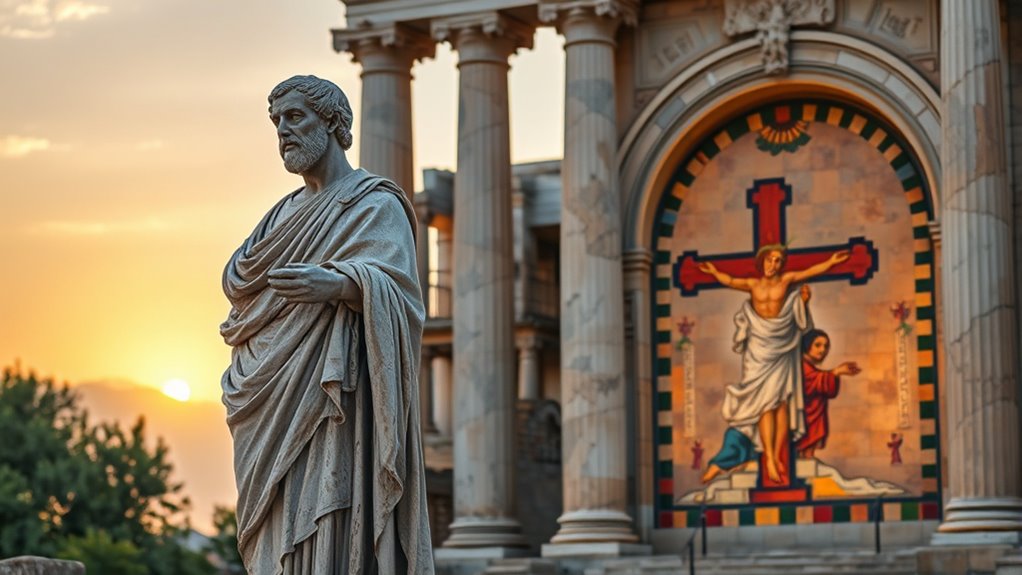You’ll find that Stoicism and Christianity share core virtues like resilience, self-control, and moral discipline, which foster inner peace and spiritual growth. However, they also clash over their views of divine authority, emotions, and salvation. Christians emphasize faith, divine grace, and a personal God, while Stoics focus on rational harmony with nature and impersonal Providence. Exploring their complex relationship reveals both tensions and surprising overlaps—stay with us to uncover how their ideas intertwine and diverge.
Key Takeaways
- Both emphasize virtue and moral discipline, but Stoicism focuses on aligning with natural reason, while Christianity centers on divine grace and love.
- They share practices like self-control and resilience, yet differ in emotional engagement—Stoics promote emotional detachment, Christians advocate love and forgiveness.
- Convergence exists in their symbolic language and allegories of growth, virtue, and divine connection, fostering philosophical and spiritual dialogue.
- Clashes occur over core beliefs: Stoicism views the universe as impersonal and rational, whereas Christianity emphasizes a personal, loving God.
- Modern debates explore integrating Stoic meditation with Christian prayer, highlighting shared goals of inner peace, moral strength, and divine harmony.
The Roots of Stoic and Christian Thought in the Ancient World

The roots of Stoic and Christian thought in the ancient world are deeply intertwined, emerging from a period when philosophy often replaced traditional religious worship. You’ll notice how Stoic emotion, emphasizing self-control and rationality, aligns with early Christian sacraments that symbolize spiritual renewal and divine grace. Both traditions sought to guide individuals in proper conduct, emphasizing virtue and moral integrity. During this time, philosophy became a way to understand life’s purpose and connect with the divine. These shared roots laid the groundwork for centuries of dialogue, highlighting how Stoic ideas influenced Christian concepts of virtue, divine connection, and the pursuit of inner peace. Additionally, the development of cultural intelligence during this period helped individuals navigate the complex interactions between different philosophical and religious traditions, promoting mutual understanding and respect. Recognizing how philosophical influence shaped early Christian teachings underscores the interconnectedness of these spiritual paths. The emphasis on moral virtue in both traditions fostered a common moral framework that persisted through centuries of philosophical and theological development. Moreover, the integration of ethical principles from Stoicism contributed to the development of Christian moral teachings, illustrating their profound interconnectedness. Furthermore, the exchange of ideas fostered a climate of intellectual synthesis, which enriched both philosophical and religious thought during this era.
Key Philosophers and Their Views on Virtue and the Divine

Key philosophers in the Stoic and Christian traditions each offer distinct perspectives on virtue and the divine that shape their teachings. They explore how Stoic emotions can be mastered through virtue, emphasizing inner peace, while Christians focus on salvation through divine grace. Their views evoke powerful emotions and inspire moral growth: 1. Stoics see virtue as aligning with nature and controlling emotions like anger and fear. 2. Christians believe salvation is achieved by divine grace, transcending human effort. 3. Stoic philosophers emphasize reason and harmony with the divine Logos. 4. Christian doctrine highlights love, forgiveness, and the divine plan for salvation. 5. Understanding the best anime movies can enrich our appreciation for storytelling that explores profound themes of virtue and morality. Both seek a divine connection, yet their paths diverge profoundly, often reflecting different approaches to moral development and the pursuit of a good life. Additionally, the concept of inner peace plays a central role in Stoic practices, guiding individuals toward a balanced and virtuous existence, with some philosophies advocating for the mastery of emotional control as a means to achieve this state. Recognizing the importance of divine intervention in Christian thought can deepen our understanding of faith-based moral guidance.
Interactions and Overlaps in Early Christian and Stoic Writings

Early Christian and Stoic writings frequently intersect through shared themes, concepts, and language, reflecting a deep philosophical dialogue that shaped early thought. You notice echoes of Stoic aesthetics in Christian sacraments—both seek inner purity and moral discipline. These overlaps foster a sense of unity amid differences, highlighting common pursuits of virtue and divine connection. Below, a table captures emotional overlaps:
| Hope & Virtue | Inner Transformation | Divine Connection | Enduring Wisdom |
|---|---|---|---|
| Light in darkness | Heart’s renewal | Sacred rituals | Timeless truths |
Additionally, an understanding of emotional support can help deepen the connection between these philosophies by emphasizing compassion and resilience.

Persecution and conflict marked Christianity’s difficult relationship with Roman authority as the new faith challenged the empire’s religious and political order. You witness Christians condemned through martyrdom narratives, showcasing their unwavering faith amidst brutal executions. Roman imperial propaganda painted Christians as atheists and threats to stability, fueling hostility. Essential oils such as frankincense and myrrh were often used in Christian rituals, symbolizing their spiritual resilience and distinct identity. The refusal to participate in Roman religious practices was a core aspect of Christian defiance, often leading to persecution. 1. Christians refused to worship Roman gods, defying imperial demands. 2. Nero blamed Christians for the Great Fire, igniting deadly persecutions. 3. Justin Martyr’s execution symbolized state rejection of Christian beliefs. 4. Persecution intensified through brutal spectacles, yet strengthened Christian resolve. This resilience was supported by their martyrdom narratives, which became powerful symbols of faith and resistance. Despite repression, Christianity persisted, transforming martyrdom into a powerful testament of faith and resistance against imperial oppression. Additionally, the persecution narratives played a crucial role in inspiring future generations of believers to endure hardships for their faith. Furthermore, the use of spiritual resilience like prayer and community support helped sustain believers during times of persecution.
Philosophical Dialogues: Legends and Real Exchanges Between Stoics and Christians

Legends and stories of real exchanges between Stoics and Christians often blur the line between fact and fiction, fueling both admiration and skepticism. You might imagine a dialogue where Stoic allegories, like the disciplined soldier or the wise gardener, intertwine with Christian symbolism, such as the shepherd or the vine. These exchanges, whether myth or memory, symbolize shared values—virtue, endurance, divine connection. You can see how symbolic representations serve as a bridge between philosophical and religious teachings, emphasizing the universal pursuit of virtue. Recognizing the interplay of virtues in both philosophies can deepen our appreciation for their shared goals of personal and spiritual development. Moreover, understanding these allegories through a cultural lens helps us appreciate their enduring relevance across different eras and communities. By exploring the historical context of these allegories, we gain a richer understanding of their significance. Picture a table where the two worlds meet:
| Stoic Allegories | Christian Symbols | Shared Values |
|---|---|---|
| The philosopher’s stone | The lamb of God | Virtue and sacrifice |
| The disciplined mind | The Good Shepherd | Endurance and faith |
| The wise gardener | The vine and branches | Spiritual growth |
| The steadfast warrior | The armor of God | Courage and resilience |
| The silent sage | The still small voice | Inner peace |

Despite their distinct origins, Stoicism and Christianity share many moral principles and ethical practices that highlight common ground. You can find this in practices like Stoic meditation and Christian prayer, both fostering inner discipline and reflection. Additionally, both traditions emphasize the importance of virtue ethics as guiding moral behavior. 1. Cultivating Virtue: Both emphasize virtues like courage, justice, and temperance as pathways to moral excellence. 2. Practicing Self-Control: Through Stoic meditation or Christian prayer, you develop resilience, patience, and humility. 3. Embracing Compassion: Both traditions advocate kindness, forgiveness, and love for others as central moral acts. 4. Seeking Inner Peace: They guide you to find serenity amid chaos, aligning your life with higher moral ideals. Recognizing the value of moral consistency helps integrate these principles into daily life, fostering genuine virtue. Furthermore, understanding the figurative language used in religious and philosophical texts can deepen your appreciation of their moral messages.
Fundamental Differences: Doctrinal Disputes and Core Beliefs

While Stoicism and Christianity share moral principles like virtue and self-control, their core beliefs about reality and divine authority differ sharply. Stoicism emphasizes emotional resilience by mastering inner responses, viewing the universe as rational and divine through impersonal Providence. In contrast, Christianity centers on a personal God who grants salvation and expects worship, with rituals like baptism and communion holding deep significance. Christianity teaches that salvation comes through faith in Christ’s sacrifice, while Stoicism advocates aligning with nature’s Logos. These fundamental differences shape each tradition’s worldview, making full doctrinal compatibility difficult, despite overlapping ethical practices.
How Christian Thinkers Incorporated Stoic Ideas Into Their Theology

Christian thinkers have actively incorporated Stoic ideas into their theology by engaging with concepts like virtue, moral self-control, and the natural order, often framing them within a Christian worldview. They adapted Stoic rituals—such as reflection and mindfulness—to Christian sacraments like confession and communion, emphasizing inner discipline. They saw Stoic focus on moral excellence as complementary to Christian virtue.
Christian thinkers integrate Stoic virtue and discipline into their theology, emphasizing moral excellence and inner reflection within a Christian framework.
- Embracing moral self-control as a path to holiness
- Integrating reflections on the natural order with divine providence
- Using Stoic practices as spiritual discipline alongside sacraments
- Recognizing shared goals of virtue and harmony, blending philosophy with faith
Modern Reflections: Bridging Stoic Wisdom and Christian Faith Today

Modern reflections on bridging Stoic wisdom and Christian faith reveal a growing interest in integrating ancient philosophical principles with contemporary spiritual practices. You might explore Stoic meditation techniques, like focusing on virtues or contemplating mortality through Memento Mori, alongside Christian prayer practices that foster surrender and gratitude. Both approaches encourage self-awareness, resilience, and a sense of divine connection. By blending these practices, you deepen your spiritual life, cultivating inner peace and moral strength. Today’s Christians and seekers find value in this synthesis, appreciating how Stoic discipline complements Christian reliance on grace, making spiritual growth more practical and grounded in timeless wisdom.
Ongoing Debate: Can Stoicism and Christianity Be Harmonized?

The question of whether Stoicism and Christianity can be harmonized has sparked ongoing debate among scholars and believers alike. Many wonder if Stoic emotions like resilience and self-control align with Christian salvation’s grace. Some see common ground:
- Both emphasize virtue and moral excellence, fostering inner peace.
- Stoic acceptance of fate echoes trusting in divine Providence.
- Their focus on personal responsibility complements Christian salvation’s call to repentance.
- Yet, conflicts arise over Stoic emotional detachment versus Christian love and grace.
While some believe they can converge, others see fundamental differences. Ultimately, engaging with both deepens your understanding of spiritual and philosophical growth.
Frequently Asked Questions
Are Stoic Virtues Directly Comparable to Christian Virtues?
When you consider virtue comparison, you’ll see that Stoic and Christian virtues share a focus on moral alignment, such as wisdom, courage, justice, and temperance. Both traditions value self-control and moral integrity, but their underlying motives differ—Stoics aim for harmony with nature, while Christians seek divine grace. Though similar, these virtues are rooted in distinct worldview, making their direct comparison nuanced yet insightful for moral growth.
Did Early Christians Intentionally Adopt Stoic Practices or Beliefs?
Did early Christians deliberately draw from diverse doctrines? Yes, they practiced ancient philosophical syncretism, blending beliefs and behaviors from surrounding cultures. Early religious influences, especially Stoic practices, shaped their understanding of virtue, patience, and perseverance. While not adopting Stoicism wholesale, they selectively incorporated its principles to strengthen faith and moral resolve, creating a synthesis that supported their spiritual journey without abandoning their core Christian convictions.
How Did Stoic Cosmology Influence Christian Doctrines of God?
You see, Stoic cosmology, with its idea of cosmic determinism, shaped Christian views of God. The divine logos, central to Stoicism, became a foundation for understanding God’s rational order and active presence in creation. This influence helped early Christians see God as the divine reason guiding everything, emphasizing His sovereignty and providence. So, Stoic ideas about the universe’s rational structure deeply impacted Christian doctrines of God’s nature.
Can Practicing Stoicism Lead to Christian Spiritual Growth?
You might think practicing Stoicism doesn’t align with Christian growth, but it can actually enhance your spiritual journey. By focusing on virtue cultivation and building emotional resilience, Stoic practices help you stay steadfast amid challenges. This discipline deepens your understanding of Christ’s teachings on self-control and humility, fostering a more resilient faith. Embracing both can lead to a richer, more balanced spiritual life, strengthening your connection with God and your inner peace.
Are There Modern Christian Groups That Explicitly Integrate Stoic Philosophy?
You’ll find modern Christian groups that explicitly incorporate Stoic philosophy, especially emphasizing secular meditation and ethical self-discipline. These groups often blend Stoic principles like virtue and self-control with Christian teachings to foster spiritual growth. They see Stoicism as a practical tool for managing emotions and cultivating resilience, aligning it with their faith. This integration encourages a holistic approach to living out Christian values through mindful practices rooted in Stoic wisdom.
Conclusion
You might think that Stoicism and Christianity are entirely incompatible, but they actually share many values about virtue and human resilience. By exploring their relationship, you can see how both traditions challenge you to live with integrity and purpose. Even if their core beliefs differ, embracing the wisdom from both can enrich your understanding of life’s struggles and virtues. Ultimately, you don’t have to choose—these paths can complement each other on your journey toward meaning.









